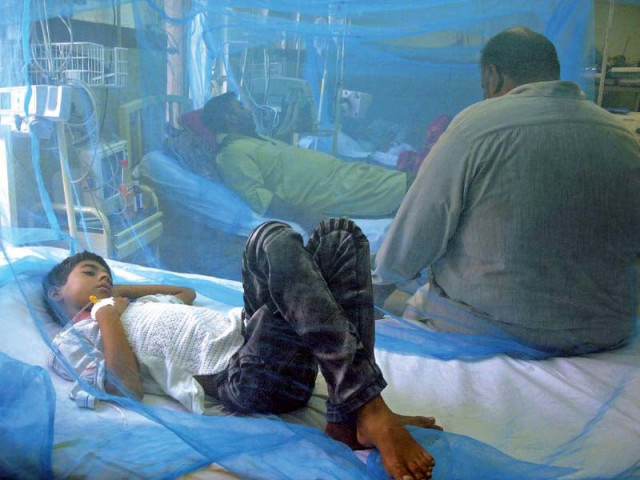Surveillance teams doubled to control dengue: SAPM
Mirza says no record of patients suffering from adverse effects of medicines

Patients lying in dengue ward of Benazir Bhutto Hospital. PHOTO: NNI
Chairing a meeting to review Dengue Control measure, Mirza directed ensuring compulsory spray for dengue and larva control. The meeting was attended by the Ministry of National Health Services secretary, director-general and officials from hospitals and administration from Islamabad and Rawalpindi.
Mirza directed officials to compile details of all dengue victims to ensure compulsory spray in the vicinity of affected areas. An emergency cell has been established in rural Islamabad at Union Council Tarlai so that to expedite active monitoring. He also directed bringing private hospitals in the ambit of surveillance.
The meeting was informed that 90% of the patients do not require hospital admission, effective consultation and guidance with proper care can improve the patient’s conditions at home.
It was shared that people should be requested to ensure that when a patient is brought to a health facility it is both the responsibility of health staff and the patient’s attendants to provide their correct address so that teams could be sent to the area to take necessary measures to protect others residing in the community.
Special Assistant to Prime Minister on National Health Services Dr. Zafar Mirza said that there was no data available of deaths and disabilities caused by hazardous drugs.
While addressing a conference on monitoring side effects of the hazardous drug, he told that around ten per cent patients in the United States (US) were admitted in hospitals due to it, however, the country lacked data in this regard.
He added that it was required to prepare a system for identification of such medicines as well as to create awareness amongst the people regarding them.
Mirza said that the country’s first medicine policy was under preparation and would be completed within eight months.
An average Pakistani was administered eight injections annually with 95 per cent of them being unrequired, the adviser added.
Further, the Chief Executive Officer (CEO) Drug Regulatory Authority Pakistan (DRAP) Asim Rauf said that they sought to attain level III of the World Health Organization (WHO) for drug preparation. He added the authority was committed to ending corruption and for promotion of transparency in the field.
The official told that the system identification of hazardous drugs was being prepared while a pharmacist had a big role in preparing safe medicines for people.
Rauf added that joint efforts were required to bring an improvement in the standard of living of countrymen.
Awareness Walk on Rabies
National Institute of Health (NIH) organized rabies awareness seminar and walk to sensitize people about disease's control and prevention aspects on Tuesday.
An event with the theme of 'Rabies-vaccinate to eliminate', was held in connection the day.
Addressing the seminar, Executive Director NIH Dr Aamer Ikram said that rabies was a deadly disease and urged that there was a need of launching a comprehensive campaign to sensitize public in this regard.
He told that a strong surveillance system, timely access to vaccine and proper management could save precious lives. Dr Ikram said that NIH was currently producing Cell Culture Anti-Rabies Vaccine and Anti-Rabies Serum and added both products were being supplied in adequate quantity to public hospitals across the country.
Further, the health expert Dr Farooq Ali Tahir said that rabies occurred after the bite of a rabid animal, usually a dog. He added incurable disease was a fatal one however taking wound care promptly after a dog bite and using standard vaccines timely could prevent disease from developing.
The event was attended by heads of different divisions of NIH, students of College of Medical Laboratories Technology (CMLT), fellows of Field Epidemiology Laboratory Training Program (FELTP) and senior officials of the institute.
Published in The Express Tribune, October 3rd, 2019.



















COMMENTS
Comments are moderated and generally will be posted if they are on-topic and not abusive.
For more information, please see our Comments FAQ